12V vs 24V: Comparison Guide for Your Camper Van Electrical System
The electrical system is one of the most important part of a camper van conversion. Especially, if you are living in your rig full time. The very first thing that you need to determine is if you want a 12V or 24V battery system. This guide will walk you through the considerations.
If you are looking for a Complete Guide to Camper Van Electrical, not just voltages, head here!
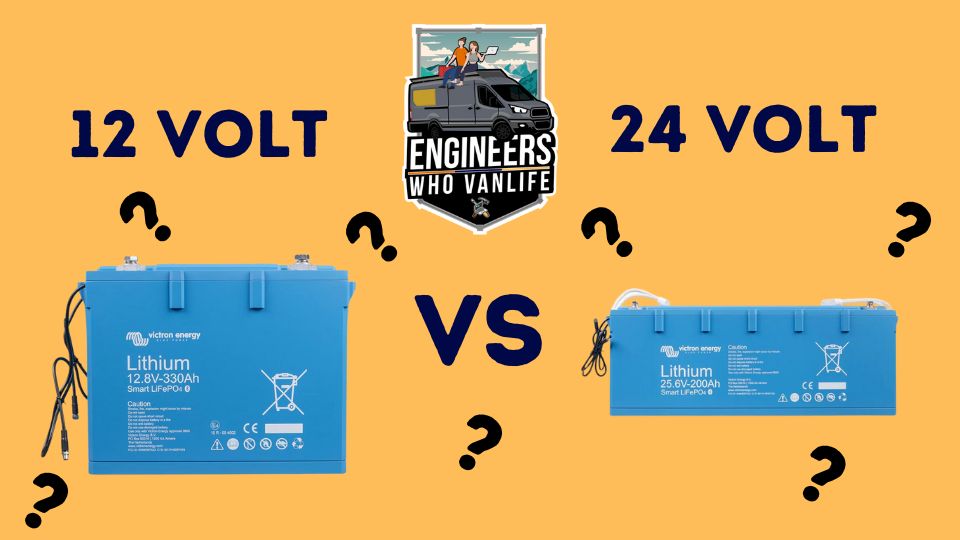
** Disclaimer: This blog post contains various affiliate links that provide a small kickback to us, at no additional cost to you. We truly appreciate your support if you choose to purchase through these! **
What is Voltage?
Voltage is the electrical potential difference between positive and negative terminals on a battery. Voltage can be thought of as the force, or pressure, that pushes current through a system. Below is Ohm’s Law:
Power (P) = Voltage (V) * Current (I)
A 24V system suppling the same amount of power will have half the current flowing through it compared to a 12V system. With that, let’s move on to the advantages of a 24V electrical system.
What Are The Advantages of 24 V Camper Van Battery Systems?
12 Volt Lithium Batteries have become the gold standard for camper van battery systems, but there is a new kid on the block. 24 V battery options are growing, and for good reason! Van lifers have increasing power demands which results in extremely high current loads in the wires when running a 12V system. As we learned in the equation above, to decrease current load, we need to increase voltage. 24V battery systems reduce the current carried by a wire in half, thus enabling higher power loads to be carried in smaller wires. Additionally, 24V systems:
- Save significant wiring costs as current load is lower
- Increase system efficiency as you operate at a lower current and higher voltage
- Bonus! Results in a cleaner system, we love smaller wires!
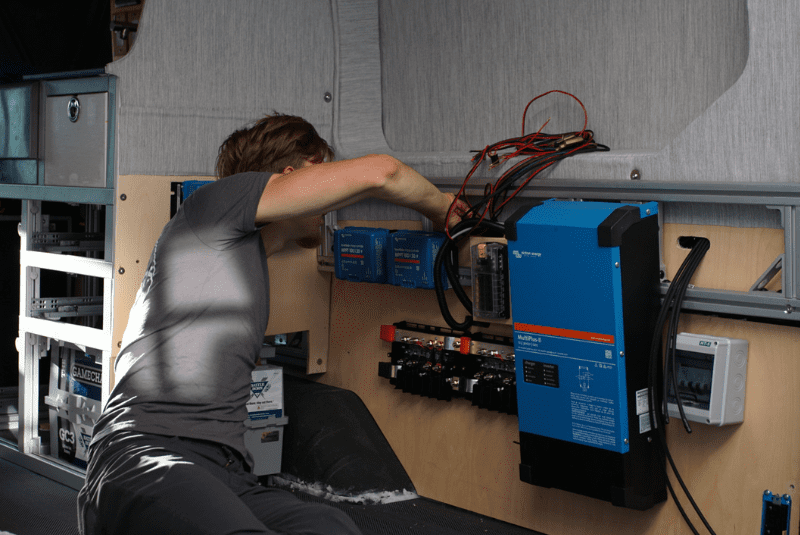
12V vs 24V System Efficiency
24V battery systems make nearly all aspects of charging more efficient. One of the main reasons is that lower current reduces resistive loss in cables. With a 24V system you can see the following efficiency gains:
- Inverters are more efficient with higher input voltages, both charging and running appliances
- Solar arrays can be wired at higher voltages to minimize current, and MPPTs will be more efficient
- DC-DC chargers are more efficient at 24V, and higher power loads are possible with dedicated charging alternators
How to Choose Between 12V and 24V Camper van Battery Systems
12V battery systems will still suit most van lifers just fine, especially those with small to medium sized electrical systems. We would call a medium sized electrical system one with a battery bank less than 400ah, and inverters that typically don’t draw more than 2000W.
24V systems will be the system of choice on large electrical systems. Although there is no hard and fast rule, if your 12V battery bank starts to exceed 400ah, your system may start to benefit from upgrading to a 24V system. By 600ah of 12V batteries, your system will almost certainly benefit**.
Additionally, if your system will have several high power devices such as air conditioning (either AC or DC), hot water heaters, or induction cook tops, your power savings due to efficiency improvements from your inverter will really stack up!
**Note that a 24V 100 ah battery has the same capacity as a 12V 200ah battery.
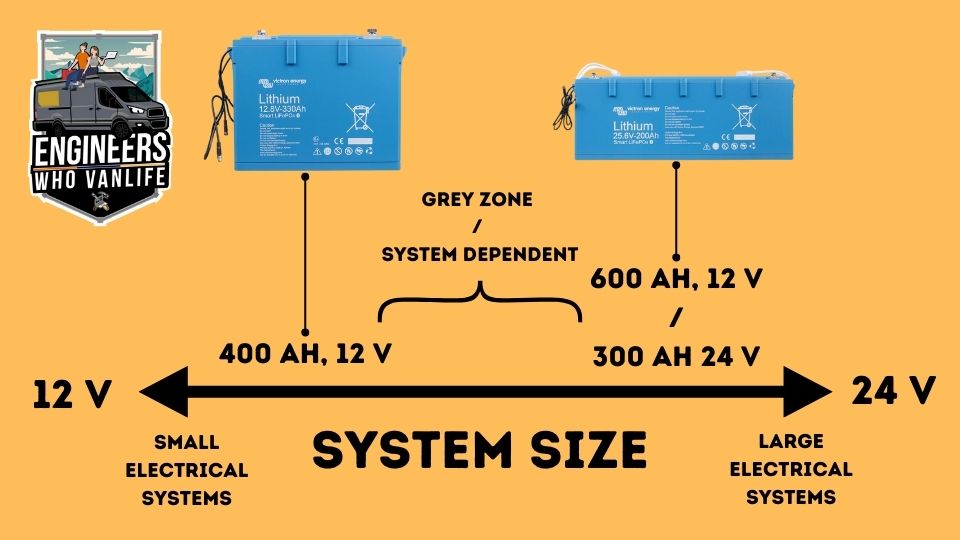
Cost Comparison of 12V and 24V Camper Van Battery Setups
24V batteries tend to have a slightly higher cost than their 12V counterparts, and the options are more limited (but growing!). However, the extra money you spend on batteries, you will save in wiring costs.
Wiring a typical 12V camper van can cost anywhere from $200 to $800 depending on your layout and the number of components, but switching to 24V can save you roughly 40% is wiring costs. Here is an “apples to apples” cost breakdown of two great camper van batteries (12 and 24V).
Appliance Considerations
Your batteries are used to power your appliances. Let’s discuss some differences in powering devices with 12V or 24V.
What Appliances Can a 12V Campervan Battery System Power?
Nearly all DC appliances for the marine and RV markets are designed to run on 12V power. Lights, water pumps, heaters, fridge/freezers, chargers, and mobile routers just to name a few! If you go with a 12V system, you will have no issues with appliance compatibility!
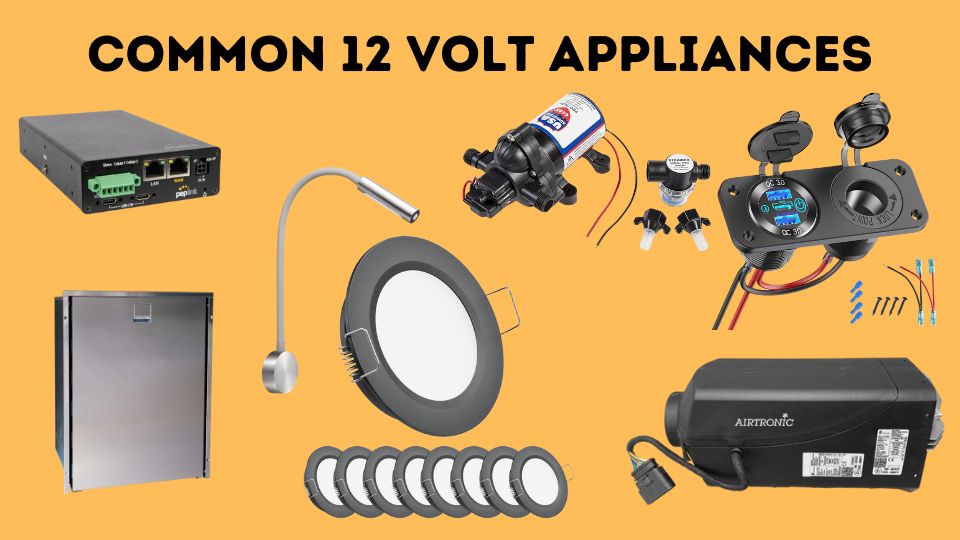
What Appliances Can a 24V Campervan Battery System Power?
The industry is catching up to make many devices 24V compatible, so you have to be careful what you buy to make sure it’s 24V compatible. Lights, pumps, fridge/freezers, and other appliances can easily be found in 24V compatible versions. Some appliances though, for example heaters and MaxxAir fans, are difficult to find in 24V. For these systems, a 24V->12V converter would be necessary, and you may even find yourself with two DC fuse blocks. One for 24V and another for 12V.
Can You Upgrade a 12V System to a 24V System?
Upgrading an existing 12V battery system to a 24V system requires significant work and is not a simple battery swap. You will need to make sure all of your main system components such as inverter, MPPT, and DC-DC charger are 24V compatible and programmed for such, as well as all of your devices such as fridge, heater, pumps, and lights.
Learn More About Camper Van Electrical Systems
As we mentioned earlier, choosing your system voltage is incredibly important, but only a small piece to the puzzle! Head on over to our additional guides for your camper van electrical system:
Thanks for being here! Happy building!
Eric + Colby
✉️ Join our mailing list for more content!
🙏🏽 If you are looking for more 1:1 van build help, we are here to help via Consulting or Travel Van Building.
[Start Here] Beginner Guides:


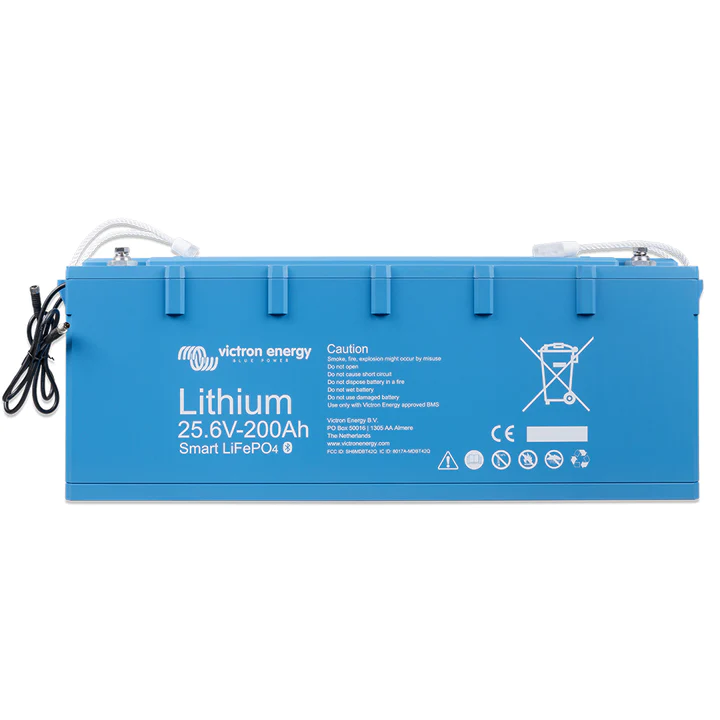
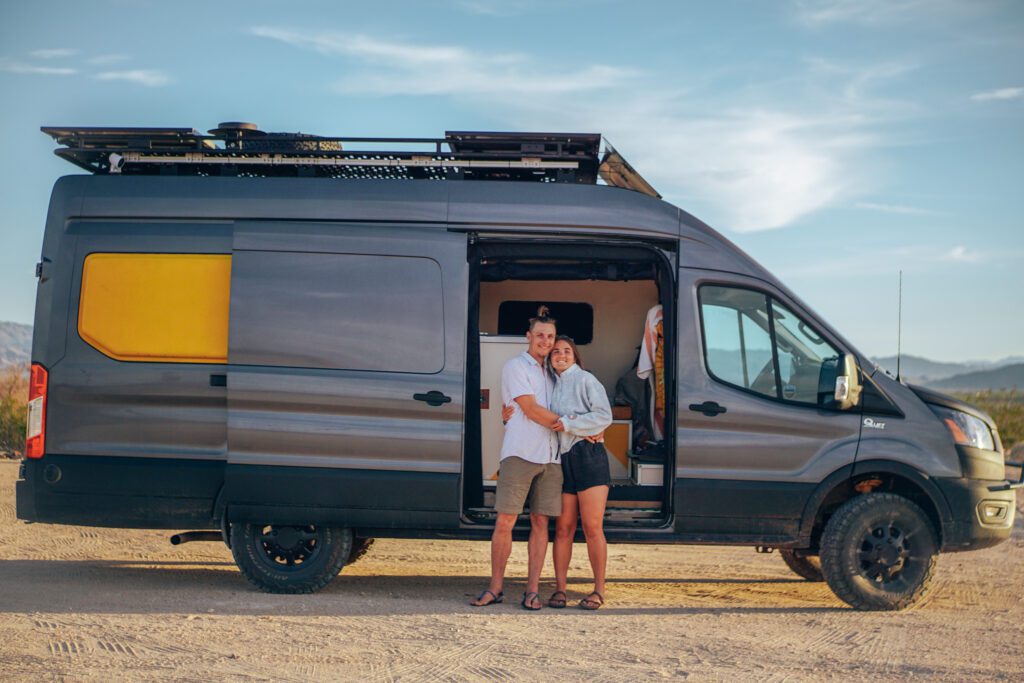




Comments 1
Hello am starting a build up and plan to consult with you
Jorge